- Home
- Roxane Gay
The Best American Short Stories 2018 Page 3
The Best American Short Stories 2018 Read online
Page 3
I’d hear music blasting. See the shapes of Jenny and a woman playing a game of naked tag outside like kids. The whitish glow of a woman’s ass in the porch light. Some nights I wondered if they weren’t playing at all, and the woman was trying to get away from him, or if play had tipped into something else. When the campers took off, Jenny would usually come over, tripping on the steps, red-cheeked and reeking of sex. He was usually drunk and happy and had a joint he wanted us to smoke. This happened a couple times a month.
“Cal, you got to try it. Young guy like you, you need to get your dick wet,” he said one evening. Koda was lying in the dirt but kept getting up and going inside and coming out again, wanting to go to bed. If she could speak, she’d whine, but instead she hovered, moving from one side of us to the other, trying to herd us inside.
“My dick’s just fine,” I said.
“Cal, I’m serious,” he said. “You got to get out of Bonner. You got to start figuring out what you want to do next.”
I was quiet. Koda gave up and lay down next to me.
“You’re not living in this trailer for good, are you?” said Jenny. “You can’t wash dishes forever.” He sat on the porch steps and stuck the unlit joint all the way inside his mouth, pulled it slowly out to coat it with spit, and passed the lighter back and forth as he rotated it, drying out the paper, before lighting it.
“Your dad was a weird duck—never knew what that guy was thinking. But guys like him, they’re so nice they sometimes can’t say what it is they want. I think wherever he is, it hurt him bad to leave you. That’s all you need to know.”
I took a big drag of the joint and coughed. We passed it back and forth, pressing our lips to the same soggy end, and sat there awhile after we finished.
“Man, I’m flipped outta my rig,” said Jenny. “Flipped outta my fucking rig!” He hauled himself up by the porch railing, taking a last coughing drag, and stumbled down the steps. He tripped on a piece of quartz on the last one, picked it up, cussed, and chucked it toward the forest. It bounced off something and came rolling back into view.
Over a year after Dad left, I was still living with Koda in that trailer, working at the Chinese restaurant. I’d been alive nineteen years and had no idea what to do with myself. I’d finally cleaned out Dad’s old wallet and threw it away. After staring into his face for a long time, I threw out his driver’s license and old ID cards too.
I saw my friend Blake outside the gas station, holding a cup of shit coffee in a fancy portable mug. It was summer. The asphalt was starting to radiate heat. Blake had heard about Dad, and he didn’t like that I was still living in the trailer.
“It’s not so bad,” I said.
He told me about Williston, where he worked on an oil rig. He was here to see his folks. “Hard living, but a couple years of this and I’ll be doing anything I want.” I didn’t understand exactly what it was he did. “Two weeks on, one off, bud. Hundred thou a year. Pretty good for a Bonner High School grad, huh bud.”
“It’s not bad here,” I said.
“Cal, you want to end up like these people?” He looked around the empty parking lot. Across the street, guys piled into a truck loaded with construction supplies, and we heard one give a loud, girlish giggle. They seemed all right to me.
“Williston’s the kind of place that can change your luck,” said Blake. “Make enough money to do whatever you want. Hell, you could live in my basement. Bring Koda. Think about it. We could get beach houses in Florida, bud. Watch ladies in bikinis walk through our yard every day. Track caribou up in Canada. You could finally teach me how to hunt.”
I’d heard about guys losing a finger or arm at those jobs, or getting hooked on pills or whatever else they had down there. But a beach house sounded nice.
In the fall Jenny and I hunted together. Mulies, mostly. Once in a while an elk. He didn’t need my help and I didn’t need his, but I think we both liked the company.
Jenny’s legs had gotten so thin his pants hung off them. Whatever sickness he had seemed to be getting worse. His face wasn’t smooth and puffy anymore. His cheekskin hung on two cheekbones. Oily skin under his eyes the color of chow mein. Looking at it made me hungry, even though I hated chow mein. The rattail was the only thing that looked healthy about him. It looked fatter than before. It reminded me somehow of the waving cat at the restaurant, this long piece of hair rooted into his skull, wagging at me as I followed it through the woods. Slowly sucking the fat out of him, but also saying, don’t worry, don’t worry. I wondered where his meat was going, since we split whatever we got. He was so skinny. I figured he gave some of it as presents when women visited.
We had to walk farther than usual to find game, and the animals we did find looked hungry. On our longest hike, I shot a porcupine. Jenny showed me how to skin it. We roasted it over a fire, and he explained you have to cook it a long time because of tapeworms. The meat was greasy and crisp and tasted like pine.
“You think my dad killed himself?” I asked. That’s what I’d come to believe. It was easiest thinking he’d made a choice and acted on it. That he hadn’t left me to go live somewhere else, or died by accident in some far-off ravine in the woods. Even if I didn’t believe it, it seemed like the best way to stop wondering.
“I don’t think he would,” said Jenny. “But you never know.”
We never saw the cougar that killed Shively’s colt. The Korean grandma told me she’d seen it on one of her nighttime walks around town. “My son thinks mountain lions are the most beautiful animal in Montana,” she said. Her son was tracking him. Wanted to stuff him, mount him on the restaurant wall like he was about to jump. “Like a display he saw in a museum in San Francisco,” she said. “It would bring business in. People like to see.” I pictured a cougar crammed with stuffing, bigger than he’d ever been alive. Stuck crouching sadly above diners. Eyes made in a factory in China by little girls. Wanting to maim these Chinese-food-eating cretins. The gross orange sauce and greasy chicken smells seeping into his corpse.
A postcard came from Blake. A well spit up black oil on the front. On the back, in smashed-together handwriting, like maybe his hands were tired, it said, Basemnt still free. Talked to my boss abt a job for you. Come out, bud. I stuck it on the fridge.
At the restaurant, I came to look forward to talking to the grandma. There was never anything to report on her son’s cougar hunt, so she’d tell me about the sad-looking man in the shrine photo and how he and her dad had sampled LSD and eaten gas-station steak and eggs every morning for a month. He’d also smuggled a lemon the size of a football from California to Korea in the ’70s. This all seemed unappealing to me, stuff I’d never want to do. The lemon, her dad said, was from a famous lemon farm and would bring his family luck. She said she came from a place called Soul.
I started smoking rez cigarettes too. Mostly quit buying beer. Drove slower to save gas, so that the trailer was now a six-cigarette drive from town. Stole more than usual from the Missoula Walmart, filling a trash can in the self-checkout line with Koda’s food and other junk and just ringing up the heavy can, which I’d later return. I’d save as much cash as I could every month, rolling the twenties and sticking them in a cigarette carton.
After work I’d sit with my back to the living room window and the forest, watching shapes the light and trees made on the wall. I made a beer last a long time, closing my eyes and sipping and looking at the shapes the sun made through the skin of my eyelids.
Blake called to tell me he’d spoken to his boss about me, but I needed to pass a test first. Over the next weeks he helped me study over the phone. I drove to Missoula for the exam. Most questions I had to just guess. At least, that’s what I thought. A few weeks later a letter came. I’d passed.
When Jenny smoked a cigarette I’d go out and smoke one too, so I could wave at him and see him wave back. I’d wave up and down, like the cat in the shrine. I’d go inside, sit on the couch, and think about how many moments like this a man could have in a
day, a week, a year. A year felt like an unbearably long time.
When Jenny didn’t want to hunt, Koda and I roamed even farther from the trailer, and I guided us back by leaving little landmarks from torn-up construction vests I’d stolen from work sites. The Clark was muddy from runoff and no longer as blue. I was still leaving trash at the huge pile in the sawmill, which was drawing more flies and bees.
One day I was sitting on the porch hoping Jenny would come over after he was finished with the woman whose camper was parked in his yard. I hoped he’d bring another joint.
I heard a strange, muffled wheeze, the kind Koda would make if she had to make a noise. At first I just saw her running. A ways behind her was the cougar. The air smelled sour. The cougar was moving fast but with a limp. In front of the cougar was Koda, running along the side of the ravine. She was heading for the brush where the forest started. I needed to run inside for the rifle, but I couldn’t move. I wanted to throw up. She was going fast for an old dog, but not as fast as I knew she could run. As she neared the forest, she became a white blur.
He got her before she could reach the brush pile. I went inside for the rifle. When I got outside they were one big shape, like a cartoon of the Tasmanian Devil I’d watched as a kid, churning up dust. He had her by the neck. I got a bead on the shape and shot. I’d hit Koda in the leg. The cougar dropped her and loped away.
I carried her back to the trailer and tried to pry the bullet out with a knife while I hugged her body to keep her still. She panted but otherwise made no sound. She grinned in pain. All I could do was move the bullet around. Finally I carried her inside and laid her on my bed.
The next morning when I woke up, Koda was gone. I got the rifle and ran outside. I ran along the ravine, thinking she maybe went for water. There was one spot with a lot of blood that looked shiny in the sun. It might not have been hers.
I looked for her until it got too dark to see.
That night I sat outside until I couldn’t feel my hands or face. I thought of how the cougar had returned to eat the rest of Shively’s colt. For the next few days I kept looking for Koda, barely taking time to eat, ditching work. I saw what I thought was cougar shit, which looks like cat shit, only bigger. There was no sign of Koda.
At work the son told me to start collecting uneaten meat from peoples’ plates for his dogs, though I was pretty sure he didn’t have any dogs. I turned the water to the hottest setting and sprayed my hands until they turned red, until I couldn’t stand it anymore. When the cook warned me a pan was hot, I’d pick it up anyway. Soon my hands were covered with burns. I couldn’t stop looking for Koda. I couldn’t sleep. I’d lie awake looking at the friendly burns on my hands. In the dark they looked like puffy leeches.
After a week, I found her. There were big cat prints around her body. Smaller prints that looked like little hands—raccoon, probably—had been patting the ground around her, as if trying to comfort the tail and the paws that still looked like paws and the matted and reeking outsides of her. None of this looked like it had ever been part of the dog that used to watch me while I slept. Her eyes were closed and her lips were pulled back into a snarl, or a grimace. Her front paws were bent, as if trying to protect her stomach; this part of her that I’d watched rise and fall was gone. The middle of her had been eaten, everything inside her rib cage and some of the bones too, and the ground where her stomach used to be was dark. The fur around her back paws was pink. I hugged her head, stroked her big smooth teeth. I buried her under the living room window, inside one of Dad’s old sleeping bags.
I threw out her bowls and blanket. I wouldn’t need them in Williston. After a few years, I’d go to California to see the lemon farms, if those still existed. I’d go to Florida and buy a house with a pool and pay someone to clean it.
I’d wake up and find Koda’s white hair everywhere. The hair both depressed and comforted me. I tried to pick it off my clothes, but it kept reappearing on stuff I’d already washed. I missed sleeping with her in my bed, letting her eat fried rice out of my hand, dumping out her water bowl, shouting her name to call her back inside, an excuse to yell as loud as I could. Later I removed her water bowl from the trash, running a finger along the rough white calcified crust. At breakfast I’d read the calcification rings like a cereal box, looking for something I could use.
A postcard arrived from Blake with the same oil well. Maybe they sold only one kind of postcard in Williston. It said in that same smashed handwriting, Florida. Beach. Caribou. Come out, brother. Boss has ben asking abt you. I put it next to the other one on the fridge. I took out the cigarette carton and counted the cash I’d saved so far. Not much.
The grandma was unhappy I missed work. She cut my hours. I tried not to worry. I quit putting twenties in the carton. Sometimes I needed to borrow a few, and I could never pay myself back.
One morning I walked to Jenny’s. He’d installed a Cherokee Nation sticker on the mailbox: a man’s face inside a red square. Above him, a star and some kind of branch. The man looked tired, stuck to that mailbox, like he was sick of seeing the mailman’s hand crammed inside his little metal establishment every day, stuffing circulars and impersonal letters, never a fat check or a Penthouse or a wedding invitation.
Jenny emerged from his trailer. He was wearing clothes that struck me as not being his, though of course they could be no one else’s. I asked him if he’d seen the cougar.
“The thing killed Koda,” I said.
“Dammit. Dammit, Cal, I’m sure as hell sorry to hear that.” Jenny scratched his knee through a hole in his jeans, moving the hole around to reach more skin. He coughed and wiped his chin. “Sometimes those big cats, they come down from the mountains when they can’t get enough to eat.”
“Jenny.” I’d never asked him for any help since my dad went away, tried never to be late on rent. I asked if he’d help me find the cougar.
“Why? You thinking of killing him?” said Jenny.
I wasn’t sure why. Maybe I did. I wanted to at least get a good look.
“I’m not sure an animal deserves getting shot for being hungry,” said Jenny. “Nope, I’m not sure it does at all.”
I resolved to go out on my own but lost my nerve.
The grandma fired me from the restaurant. Her son’s son had aged out of his paper route. “My grandson tried to find a job everywhere else in town, you know. He did not want to work here. But no one would hire him. You’re a good worker, but he’s family, you know? You know we are the only Korean people in Bonner?” She lit her cigarette on the third try and tucked my lighter into my sweatshirt pocket.
“We had a Korean restaurant but no one came. People here only want shit Chinese food. No kalguksu, no gimbap, no bibimbap. Nothing crazy. Nothing they wouldn’t like. But they didn’t want it. They wanted shit. They wanted very cheap, big portion of shit.” She closed her eyes. “What I decide is, people want shit, you give them shit,” she said.
I finished my shift even though she implied I wouldn’t get paid for it. I wondered if my trailer was shit, if my way of living was shit. If Dad’s life had been shit. As I was leaving—I later regretted this—I kicked the shrine. Clementines rolled across the floor, and the grandma’s dad, the lemon smuggler, tipped face-first onto the ground. The cat fell on its side but kept waving.
“Bibimbap! Bibimbap! Bibimbap!” I said. I shot the place up with guns I made with my hands. I didn’t shoot any people, just the walls. Even this felt wrong to me. But something had clenched inside me when I got fired, Williston and beach houses and chicks in bikinis all shriveling up, and so I shot. I looked back before running out, and the grandma was standing there, looking tired and old.
I’d already sold Dad’s truck, and the money from that was gone. The two oil wells had slid lower and lower on my fridge as the magnet lost its stick. It was almost winter. I daydreamed about jumping into a Florida swimming pool, my body cold all over and weightless. I’d keep a waving cat in the window where I could see it from the pool, r
eminding me that the times I worried about money were over for good.
When Jenny didn’t come by to pick up rent a few days later, I went to check on him. He answered the door with his rattail in his hand. Its fat body curled over his shoulder like a snake. The planter of cigarette butts had been tipped onto the ground next to the porch. Someone had tried to peel the Cherokee man off the mailbox and failed, or the weather was slowly undoing whatever made it stick.
“Jenny,” I started. I was going to tell him they’d fired me.
“You call your mom? Bet she’d like to hear from you.” He was slurring. He seemed to be having trouble walking and took my arm. With his free hand, he put his rattail in his mouth and chewed. He chewed and stared at me and opened his mouth, using his lip to flap the end of the braid. He removed the rattail and held it in his hand, and we both looked at it. Up close, the hairs were all squiggly, like he’d been electrified.
“I don’t talk to my mom,” I said. “Never have. You knew that.”
He wanted me to come inside. He went into the back room where it was dark. He kept sheets nailed over his windows to keep out the light. I heard him take a big huff of something, moving around. I found him in his bathroom, pants down, lying on the floor. I decided for his pride to leave him there.
The next day I went again to tell him about getting fired. I wouldn’t be able to pay rent that month or maybe ever. I’d brought the last twenties I’d saved to give him, but before knocking I’d tucked two or three back in my pocket.
We were standing on his porch. That morning I’d found a white, worry-doll-shaped mummy of hair the size of my thumb. One of Koda’s hairballs. No matter how much I cleaned, parts of her remained.
“You know, maybe your dad did kill himself. Maybe it’s best to think that. Man, I think about going that way, taking a rifle and going out back into the forest here, maybe on the river. I’ve lived a good life, you know. I’m about ready to give up.” Jenny spit into the planter. “I think Koda maybe went that way too.”

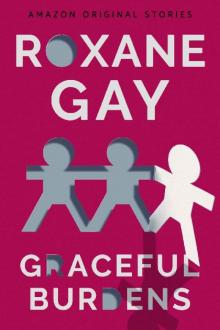 Graceful Burdens (Out of Line collection)
Graceful Burdens (Out of Line collection)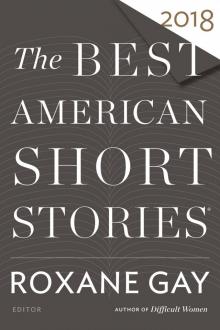 The Best American Short Stories 2018
The Best American Short Stories 2018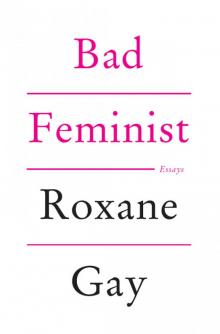 Bad Feminist
Bad Feminist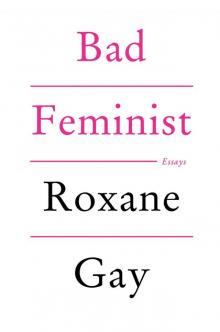 Bad Feminist: Essays
Bad Feminist: Essays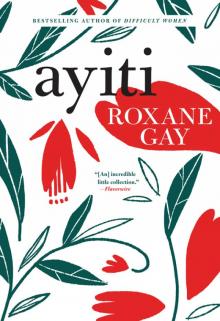 Ayiti
Ayiti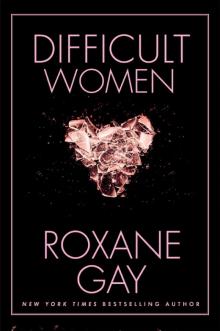 Difficult Women
Difficult Women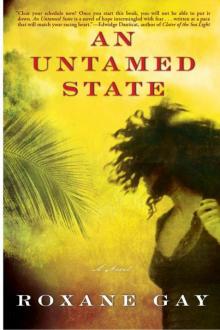 An Untamed State
An Untamed State Hunger
Hunger